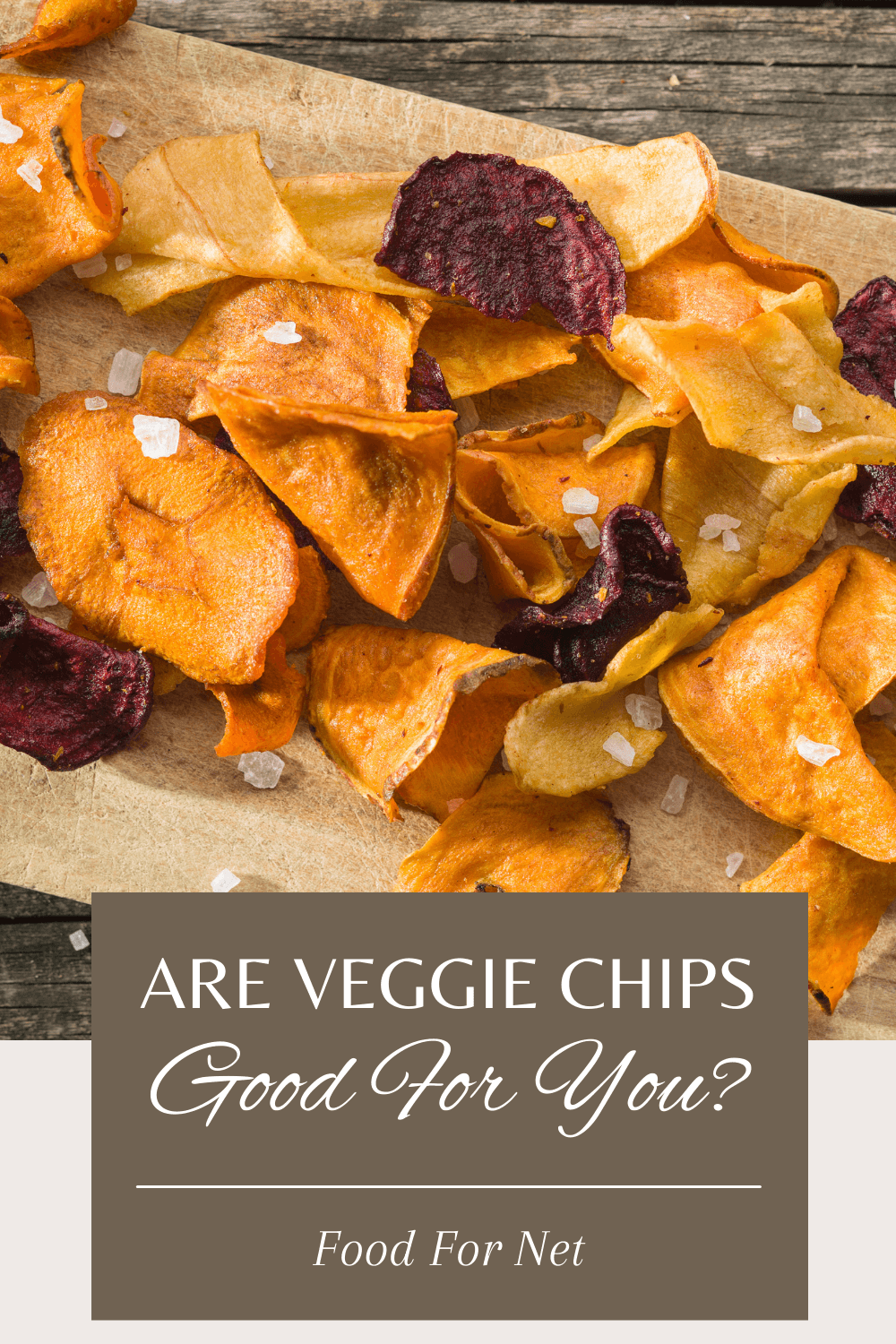
Veggie chips and veggie straws seem like a fantastic alternative to potato chips, giving you more nutrients, less fat, and perhaps even fewer carbs. They’re easy to find as well, with plenty of different brands to choose from. But are veggie chips good for you?
There’s also some fantastic marketing going on with veggie chips. The combination of images, packaging, and health claims can make veggie chips sound simply amazing. So, are they? Are veggie chips good for you?
To answer that question, we need to talk about how veggie chips compare to potato chips, along with the different types of veggie chips out there. The differences are important, as some veggie chips are highly processed and don’t rely on vegetables much at all, while others are essentially dehydrated or baked vegetable slices.
Not surprisingly, the health effects vary considerably depending on the version of veggie chips that you choose.
Are Veggie Chips Good For You?
- Types Of Veggie Chips
- Problems With Veggie Chips
- Benefits Of Veggie Chips
- Are Veggie Chips Better Than Potato Chips?
- Final Thoughts
Types Of Veggie Chips

Veggie chips fall into a few styles. Some of them are similar to veggie straws, where they are highly processed. Others go through much less processing and focus on whole food ingredients instead.
Highly Processed Veggie Chips
The products from Sensible Portions are classic examples of processed food. Their Wavy Chips use potato flour, potato starch, and canola/sunflower/safflower oil as the first three ingredients, followed by salt and sugar.
It’s only after all those that you see dehydrated spinach and dehydrated tomato as ingredients. Honestly, the only reason these can even be called veggie chips is because potato is a vegetable.
Nutritionally, an ounce of the chips contains 130 calories, 7 grams of fat, 1 gram saturated fat, 16 grams of carbs, and no fiber. You’re also getting 230 mg of sodium per serving.
There are some nutrients present, but the amounts aren’t that exciting at all. In fact, these chips are a far cry from vegetables. They won’t help with your daily vegetable targets, nor are they particularly healthy.
Single Ingredient Veggie Chips
Single ingredient chips are the other end of the scale. These often rely on just a single ingredient to make the chips and are typically roasted or baked, rather than being deep fried.
This is the case for Rhythm Naked Beet Chips, which are simply dehydrated beets with no other ingredients. Some brands add salt to the veggie chips and that’s it.
Many such veggie chips can be made at home too. Kale chips are a fantastic example here, as you can simply bake these in an oven.
Moderately Processed Chips
Finally, some chips fall between the two extremes. For example, Rhythm Original Kale Chips are mostly just dehydrated kale, but they do use other ingredients for flavoring, including tahini, apple cider vinegar, cane syrup, and lemon juice.
There are also these Cauliflower Crisps from Hippie Snacks, which are more processed again, but still focus on real veggies and keep the ingredients list fairly short. Such products could be appealing because their taste and texture are familiar (versus options like kale chips, which can be challenging to get used to).
Problems With Veggie Chips
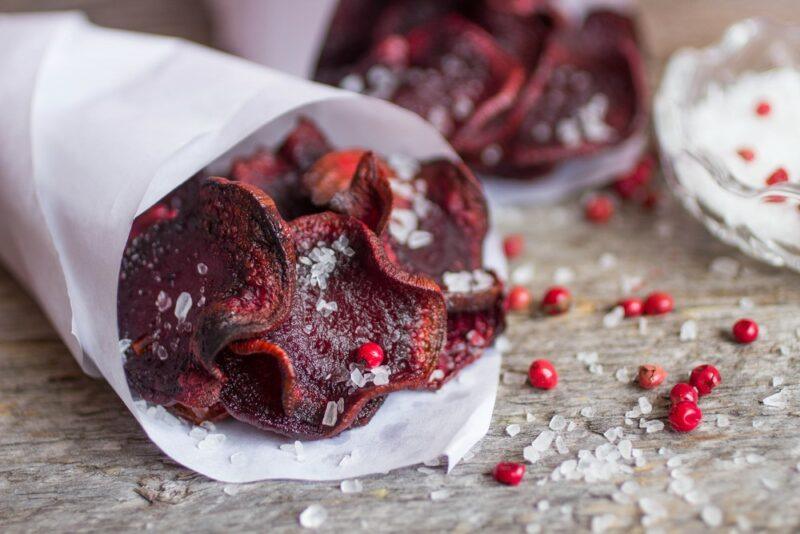
They’re High In Sodium
Chips are generally salted and veggie chips are no exception. The salt is what makes them taste so good, but it can be a problem too.
In particular, excessive sodium intake can increase your blood pressure, which can then raise your heart disease risk. Sodium is also vital for your body’s fluid balance and too much of it may cause fluid retention.
The impacts of the sodium will vary depending on how much you’re already consuming. Common recommendations suggest having less than 2,300 mg of sodium per day (the average in the U.S. is up around 3,400 mg instead).
If your diet is pretty low in sodium, veggie chips mightn’t be a big problem. But, if you’re already consuming plenty of sodium, veggie chips aren’t wise at all.
Interestingly, veggie chips often contain more sodium than potato chips. This is another reason for reading the ingredients label carefully. Look for brands that don’t go overboard with their sodium content and keep your portion sizes reasonable.
They’re Often Low In Nutrients
Veggie chips tend to be very low in nutrients. This is particularly true for the highly processed versions, as some nutrients are lost during the processing steps.
Plus, such products often don’t rely heavily on vegetables to begin with. Some just use ingredients like spinach powder to provide color. The amounts of such ingredients are so low that you’re generally not getting many nutrients from them.
Less processed versions will give you more nutrients. This is particularly true for single-ingredient products, like kale chips or carrot chips. However, you’ll still get more nutrients by focusing on fresh vegetables.
They’re Not Satisfying
It’s not just nutrients that are concerning. Veggie chips are often fairly low in protein and fiber.
This makes them fairly unsatisfying, so it’s easy to eat a lot of them at a time. This is a huge problem with potato chips too – and is part of the reason that you can have multiple servings in a sitting without even trying.
They’re Carb Rich
There are also the carbs to talk about. Processed veggie chips are the worst here, often containing large amounts of carbs and almost no fiber.
Minimally processed chips are better, but many of them are still surprisingly high in carbs.
Carbs are heavily debated these days, as they’re often linked to increases in disease risk and inflammation. While the carbs from whole and nutritious foods, like grains and legumes, could be beneficial in some situations, carbs from highly processed foods come with few benefits and many risks.
If you’re worried about carbs, it’s best to focus on unprocessed veggie chips. The carb content also varies depending on the type of chip you’re focusing on. For example, sweet potato chips are much higher in carbs than kale chips.
They’re Advertised As Being Healthy
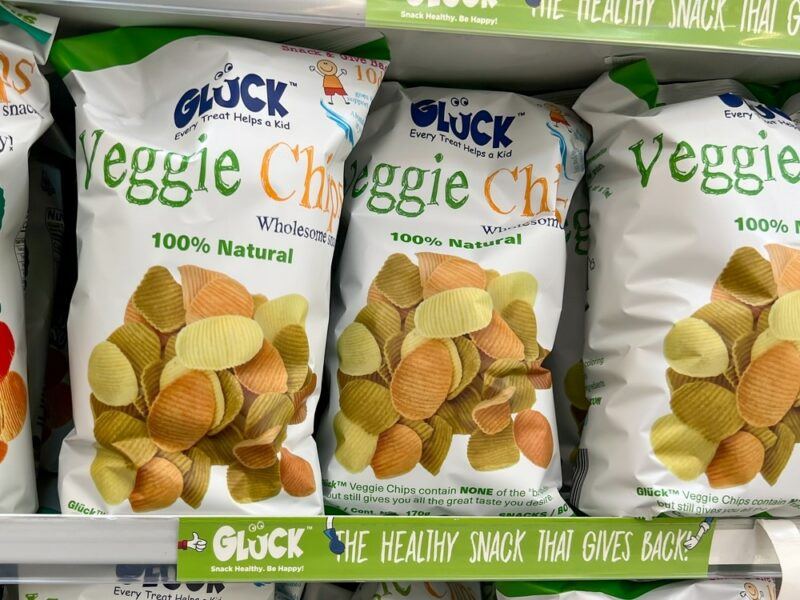
The fact that processed veggie chips aren’t nutritious is bad enough. What makes things even worse is that they’re often promoted as being good for you.
For example, some companies say their product contains 30% less fat than potato chips. The word natural might be used on the package too, along with images of fresh veggies. You might also see claims that a product is cholesterol free or free from artificial flavors.
Such claims are generally accurate, but they’re also misleading. They imply that veggie chips are healthy, when in practice, they’re often just healthier than some other products.
The marketing means that customers sometimes assume that veggie chips are good for them, then way overdo it with the amount they consume.
Could Lead To Weight Gain
Veggie chips seem like a good option for your weight, as they’re often lower in calories than regular chips. However, they can easily have the opposite effect.
Part of the problem is that it’s so easy to go overboard with veggie chips. Having large servings regularly could easily impact your waistline.
The image that veggie chips are healthy works against you too, as you’ll often pay less attention to your portions when you’re eating healthy food compared to unhealthy options.
Benefits Of Veggie Chips
So far, we’ve covered a long list of problems with veggie chips. What about benefits, then? Are there any?
They’re A Convenient Snack
The biggest benefit of veggie chips is that they’re. Veggie chips are a snack that you can buy at plenty of stores and simply eat as-is. There’s nothing for you to prep at all.
Most products also have a long shelf life. You can easily buy a few bags and keep them at home for whenever you need a snack.
Veggie chips are an easy choice for parties as well.
Some Types Have Nutritional Benefits

Processed veggie chips don’t have much going for them at all. But, they’re not the only type out there.
Products that rely on just a few ingredients and actual vegetables (rather than vegetable powders) tend to be much more nutritious. The right product should give you most of the benefits of the original vegetable, while also being low in calories and fat.
You can even make veggie chips at home, giving you more complete control over the process. Baking the chips in an oven or using an air fryer allows you to get the crispness of regular chips, without using much oil.
Some Vegetable Chips May Provide Antioxidants
Minimally processed veggie chips should still give you some of the antioxidants found in the original vegetable. After all, the chips have often just been dehydrated or baked, so much of their chemicals are intact.
This is a powerful feature, as antioxidants are associated with plenty of health benefits. In particular, they help to decrease oxidative damage throughout your body. By doing so, antioxidants help to lower disease risk.
Are Veggie Chips Better Than Potato Chips?
In general, yes, veggie chips are often a little healthier than potato chips. This is even true for highly processed versions.
For example, an ounce of Lay’s Classic Potato Chips contains 160 calories, 10 grams of fat, 1.5 grams of saturated fat, 15 grams of carbs, and 1 gram of protein. The same serving of Sensible Portions Veggie Chips contains 130 calories and is slightly lower in fat and saturated fat.
Honestly though, the differences aren’t dramatic.
Minimally processed chips tend to be healthier. For example, Bare Carrot Chips contain 140 calories per serving, no fat, and much more fiber. Products like kale chips are even healthier, often just giving you 50 calories per serving, along with more nutrients.
Even so, it’s important to check the nutritional label for whatever chips you choose, as some might be more concerning than you expect.
Final Thoughts

Highly processed veggie chips don’t have a lot going for them. They often heavily rely on potato flour and potato starch, then include some dehydrated vegetables for good measure.
The nutritional profile isn’t that much better than potato chips and it’s easy to eat too many chips in a serving.
Less processed chips offer some benefits. They’re often lower in fat and calories than potato chips, and could be more nutritious too.
Of course, the less processed chips often don’t have the texture and flavor that you’re looking for. Many of them remain high in sodium as well.
An alternative is to ship the idea entirely. Why not try cutting vegetables into straws or circles and dipping them.
That said, you don’t need a perfect diet to stay healthy. You might still want a crispy and salty snack from time to time. If you do, even processed veggie chips might be okay, as long you keep your portions reasonable and don’t have them too often.
Frequently Asked Questions
Are Veggie Chips Keto?
Most veggie chips are very high in carbs and aren’t keto friendly at all. However, you can make some keto friendly versions by baking or dehydrating low carb veggies, like zucchini or kale.
Are Veggie Chips Good For Diabetics?
Processed veggie chips aren’t great for diabetics at all, as they consist of simple carbs and little else. Homemade veggie chips are a different story. These tend to be much healthier, with fewer carbs and more nutrients.
Are Veggie Chips Gluten Free?
Veggie chips are often gluten free, but it still pays to check the ingredients label – as some may use gluten-containing ingredients. If you’re concerned, look for the words ‘gluten free’ on the product label. This ensures the product truly is free from gluten.
Are Veggie Chips Good For Weight Loss?
While veggie chips are often lower in calories than potato chips, they don’t always help with weight loss. For one thing, they’re not satisfying, so you risk overdoing it with your portions. And, honestly, eating heavily processed foods is never ideal for weight loss.
Minimally processed veggie chips are healthier and contain fewer concerning ingredients. They can work better as a weight loss snack, but still won’t be satisfying.
Are Homemade Veggie Chips Healthy?
Homemade veggie chips can be healthy, depending on how they’re made. The trick is to use few ingredients. Using sliced baked vegetables with some herbs and spices is an easy way to make wholesome veggie chips.


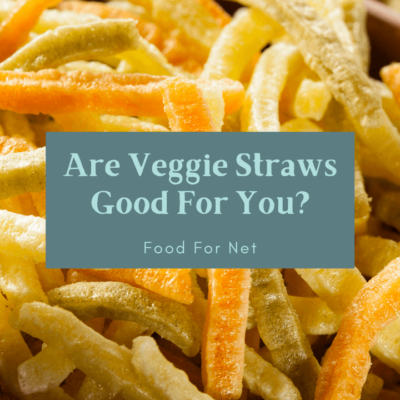
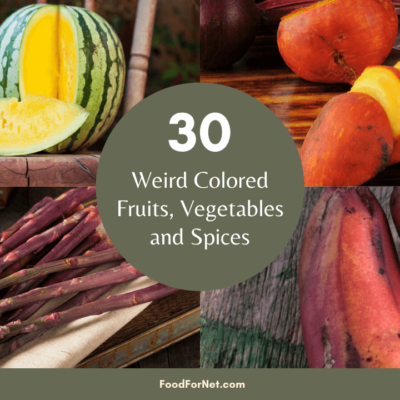


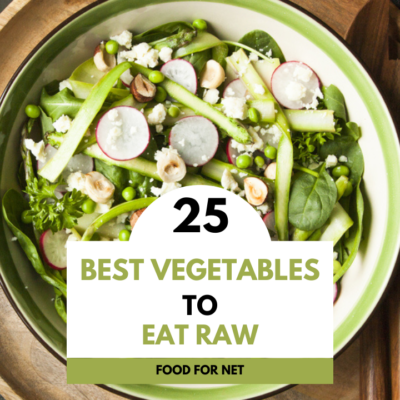
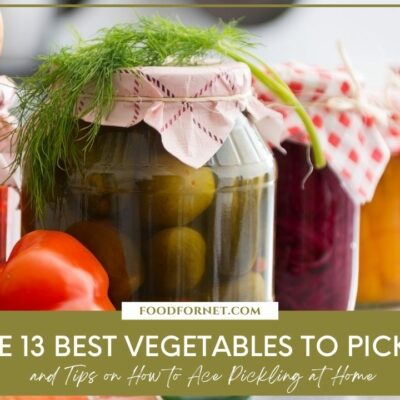


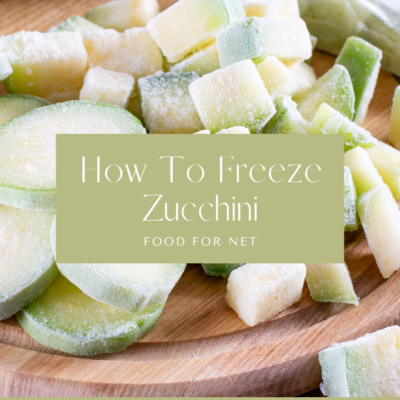

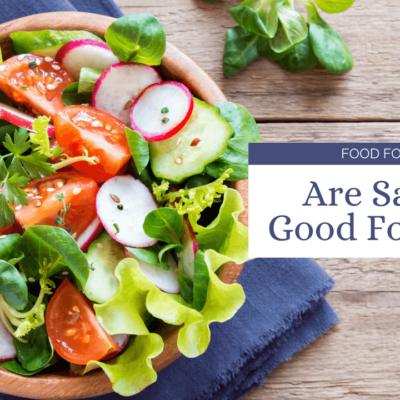
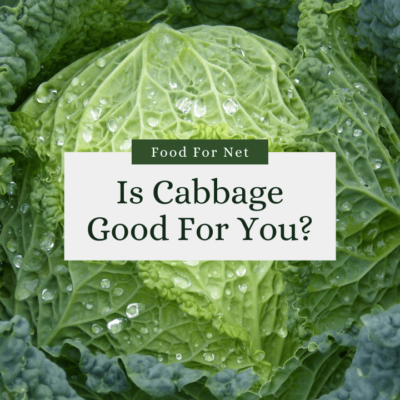

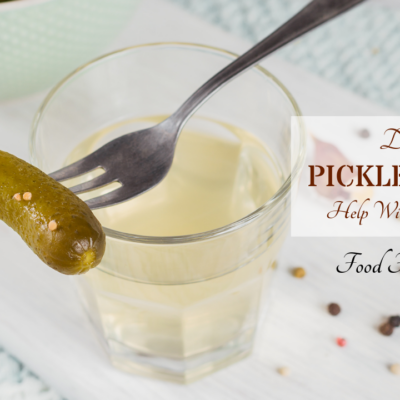

 Are Quest Bars Good For You?
Are Quest Bars Good For You?
Leave a Reply